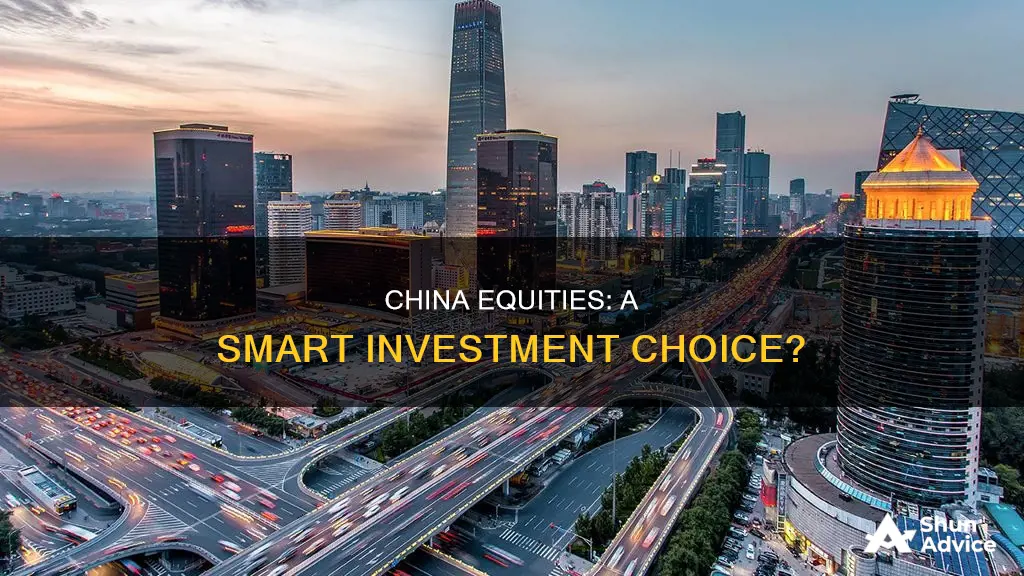
China's equity market is large and deep, with a combined market capitalisation of the exchanges in Shanghai, Shenzhen and Hong Kong of USD 18.8 trillion. This provides attractive opportunities for investors to gain exposure to China's growth story. China's economy is the second-largest in the world and is expected to continue its rapid growth, with its GDP growing at an average of almost 10% per year since 1978. China's equity markets have become more dynamic and reflective of the country's economic direction, with state-owned enterprises (SOEs) reducing their influence and non-strategic SOEs behaving more like profit-seeking entities. Corporate governance in China is also improving, with the increasing use of international auditors and accounting standards. China's markets can be highly liquid, with domestic retail investors dominating the market for A-shares, and the country is leading the way in many industries of the future, such as electric vehicles and renewable energy. While there are risks associated with investing in China, including its communist structure and regulatory differences, the potential rewards are significant, making it an attractive investment opportunity for many.
What You'll Learn

China's large and dynamic equity market
China's equity market is large and deep, with the combined market capitalisation of the exchanges in Shanghai, Shenzhen and Hong Kong, plus US-listed American depositary receipts (ADRs), totalling USD 18.8 trillion as of December 2020. This makes it a very attractive opportunity for investors to gain exposure to China's growth story.
China's equity markets have become more dynamic and reflective of the country's economic direction. State-owned enterprises (SOEs) have seen their influence reduced through significant reforms, and non-strategic SOEs are now behaving more like profit-seeking entities. Chinese equity indices have evolved over time, becoming more dynamic and reflective of the economy's trajectory.
The country's equity market is also benefiting from government investment in "new infrastructure", including foundational technologies such as artificial intelligence and electric vehicles. China aims to reduce its reliance on foreign technologies and become a global leader in these areas. This is evident in the number of patent filings in China, which grew by more than 450% between 2009 and 2019, outpacing the top economies in the world.
Corporate governance in China is also improving. Listed Chinese companies are required to use international auditors and accounting standards, file quarterly reports, and end their fiscal year on December 31. Additionally, an increasing number of state-owned and private enterprises offer employee stock ownership programs, turning employees into shareholders with a stake in the company's success.
China's markets can be highly liquid, with domestic retail investors dominating the market for A-shares and accounting for more than 80% of daily turnover. The investment culture in China is focused on momentum and short-term trading, resulting in a high stock turnover ratio for China A-shares compared to other major markets.
Best Places to Buy Investment Portfolios: A Comprehensive Guide
You may want to see also

Government investment in innovation
China's government is investing heavily in innovation and technology, with a recent announcement of a $52 billion investment in research and development for 2024—a 10% increase on the previous year. This commitment to innovation is a key part of the country's development blueprint as it moves away from its role as the world's low-cost manufacturer.
China is now home to many of the fastest-growing start-ups globally, and its population's ability to adapt to and adopt innovations at speed and scale is unprecedented. This hyper-adaptive population is a key driver of China's global competitiveness.
The country is leading the way in many future-focused industries, including electric vehicles (EVs), with firms like BYD gaining international recognition. China is also a dominant player in renewable energy sources such as solar and wind power, as well as batteries and supply chain management.
China's government has recognised that innovation is the key to future growth and is prioritising technology and innovation in its economic strategy, with a focus on advanced manufacturing. This shift in focus is a significant structural change that is great news for long-term investors.
While there are challenges and risks to investing in China, including its communist structure, regulatory differences, and insider trading issues, the country's economic growth and innovation-driven development make it an attractive prospect for investors.
Reviewing Your Investment Portfolio: A Comprehensive Guide
You may want to see also

Improving corporate governance
China's rapid economic development has demanded increased attention to corporate governance from regulatory bodies, companies, academics, professionals, investors, and other parties. The country's unique political system and economic growth present a complex corporate governance landscape that requires careful consideration and understanding. Here are some key aspects of improving corporate governance in China:
Regulatory Framework
The China Securities Regulatory Commission (CSRC) plays a crucial role in promoting effective and comprehensive governance for listed companies in Mainland China. In 2002, the CSRC released the Code of Corporate Governance for Listed Companies, which sets out basic governance principles, shareholder rights protections, and a code of conduct for directors, supervisors, and senior management. This code has become the standard measure for evaluating the strength of corporate governance practices among listed companies in China.
Shareholder Rights
Shareholder rights are protected by law, administrative regulations, and the company's articles of association in Mainland China. Listed companies should ensure that all shareholders, especially minority holders, enjoy the same status and rights as majority owners. China recognizes the principle of "one-share, one-vote" at annual general meetings (AGMs), and listed companies are expected to take measures to prevent shareholders or related parties from engaging in improper fund transfers or asset transactions.
Board of Directors
Boards of directors are directly accountable to shareholders and are responsible for overseeing the company's operations. The board secretary is responsible for preparing board and shareholder meetings, maintaining governance-related documents, and disclosing information to shareholders. Directors are expected to act independently and fulfill their fiduciary obligations while paying attention to the rights and interests of minority shareholders.
Audit and Supervisory Committees
All listed companies in Mainland China are expected to establish audit committees, subject to shareholder approval. These committees play a crucial role in overseeing financial reporting and internal controls. Supervisory committees, required for all limited companies, include shareholder and employee representatives and are responsible for monitoring the company's operations and protecting the interests of stakeholders.
Remuneration and Evaluation
Listed companies are encouraged to establish transparent remuneration and incentive systems, as well as mechanisms to evaluate the performance of directors, supervisors, and managers. The evaluation process should be led by the board of directors or a dedicated remuneration committee. Executive remuneration is approved by the board and disclosed at AGMs.
Transparency and Disclosure
Continuous and fair disclosure of information is a key responsibility for listed companies in Mainland China. They should disclose all information that significantly impacts shareholders and stakeholders in a timely and accurate manner. Listed companies should also establish mechanisms for handling information requests, visits, public queries, and shareholder engagement.
Corporate Social Responsibility (CSR)
CSR is an important aspect of corporate governance in China. Listed companies are expected to safeguard the interests of stakeholders and demonstrate a commitment to environmental protection, public welfare, and social responsibility. China's ambitious climate goals and increasing focus on ESG (environmental, social, and governance) factors play a significant role in shaping corporate practices.
By addressing these aspects and continuously improving corporate governance practices, China aims to create a more stable and attractive investment environment, fostering economic growth and global competitiveness.
The Role of an Investment Operations Manager Explained
You may want to see also

High market liquidity
China's equity markets can be highly liquid. Liquidity refers to the ease with which an asset can be converted into cash, and it is influenced by the number of buyers and sellers in the market. A liquid market is one in which there are many buyers and sellers, making it easy to transact without significantly impacting the asset's price.
China's equity market is large and deep, with a combined market capitalisation of the exchanges in Shanghai, Shenzhen, and Hong Kong of USD 18.8 trillion as of December 2020. This is significantly higher than the USD 10 trillion market cap of euro-area equities. The high liquidity in China's markets is driven by domestic retail investors, who account for more than 80% of daily turnover in A-shares. The investment culture in China is focused more on momentum and short-term trading, resulting in a stock turnover ratio for China A-shares that is among the highest in the world.
The high liquidity in China's equity markets provides several benefits for investors:
- Ease of trading: The presence of many buyers and sellers makes it easier for investors to enter and exit positions without significantly impacting the price of the asset. This is especially attractive for foreign investors, who may be hesitant to invest in a market where it may be difficult to sell their holdings if needed.
- Improved price discovery: High liquidity can lead to more accurate pricing of assets, as a larger number of market participants incorporate their information into the price. This can reduce the risk of investing based on inaccurate or outdated information.
- Reduced transaction costs: In a liquid market, the bid-ask spread (the difference between the buying and selling prices) tends to be narrower, reducing the cost of trading for investors.
- Enhanced risk management: Liquidity allows investors to quickly convert their holdings into cash if needed, reducing the risk of being stuck with illiquid investments during market downturns.
However, it is important to note that high liquidity can also lead to increased volatility, as large numbers of buyers and sellers can quickly drive up or drive down prices. China's equity markets have experienced periods of high volatility, although during the peak of the pandemic crisis in 2020, China was less volatile than the US.
Overall, the high liquidity in China's equity markets provides both opportunities and challenges for investors. It enables easier trading, improved price discovery, reduced transaction costs, and enhanced risk management. However, investors should also be prepared for potential volatility and the impact of short-term trading behaviour on market prices.
Selecting Investment Managers: Key Considerations for Success
You may want to see also

China's leading role in future industries
China is leading the way in many of the industries of the future. At the recent Third Plenum, the government outlined its prioritisation of technology and innovation in the economy, with a focus on advanced manufacturing.
China is at the forefront of electric vehicles (EVs), with firms like BYD gaining wider recognition. China represents around 18% of the global economy but Chinese equities (even with a good run of performance) only account for around 3% of the MSCI ACWI global index.
China leads or is on par with global leaders in commercial nuclear power and electric vehicles and batteries. It lags behind for now in other key sectors, including robotics, biopharmaceuticals, chemicals, and AI. But it is making rapid progress.
China is also a dominant player in solar and wind power, batteries and many other industries. In addition, it’s the leading economy in supply chain management.
Although geopolitics might mean Chinese firms struggle to operate in the US, there are plenty of other markets for them to expand into. Over time we are likely to see innovative, future-focused Chinese companies become dominant in Latin America, the Middle East, Africa and Southeast Asia.
Ethereum Classic: A Guide to Investing for Indians
You may want to see also
Frequently asked questions
China's economy is massive and continues to grow at a fast pace. China's gross domestic product (GDP) growth has averaged almost 10% per year since 1978.
There are concerns about China's mounting debt, the overall sustainability of its economic growth, and the country's political policies.
China's equity market is large and deep, with a combined market capitalisation of the exchanges in Shanghai, Shenzhen and Hong Kong of USD 18.8 trillion.
China's equity markets can be highly liquid, with domestic retail investors dominating the market for A-shares and accounting for more than 80% of daily turnover.
China is leading the way in many industries of the future, including electric vehicles (EVs), solar and wind power, batteries, and supply chain management.







